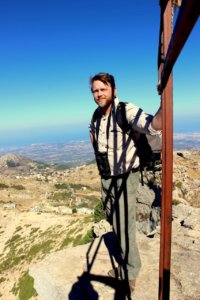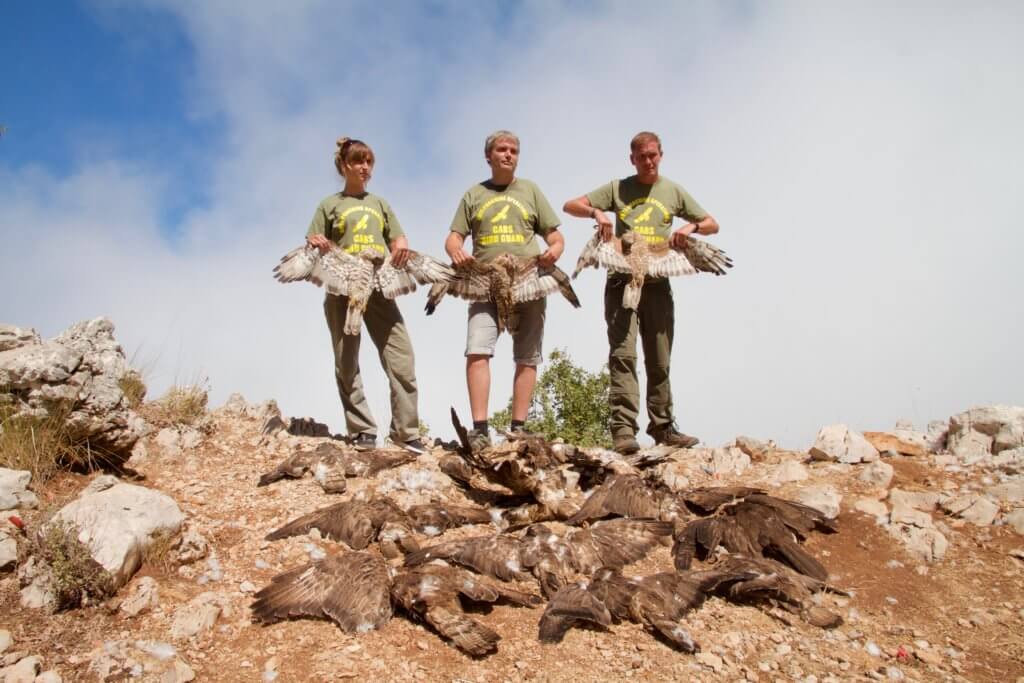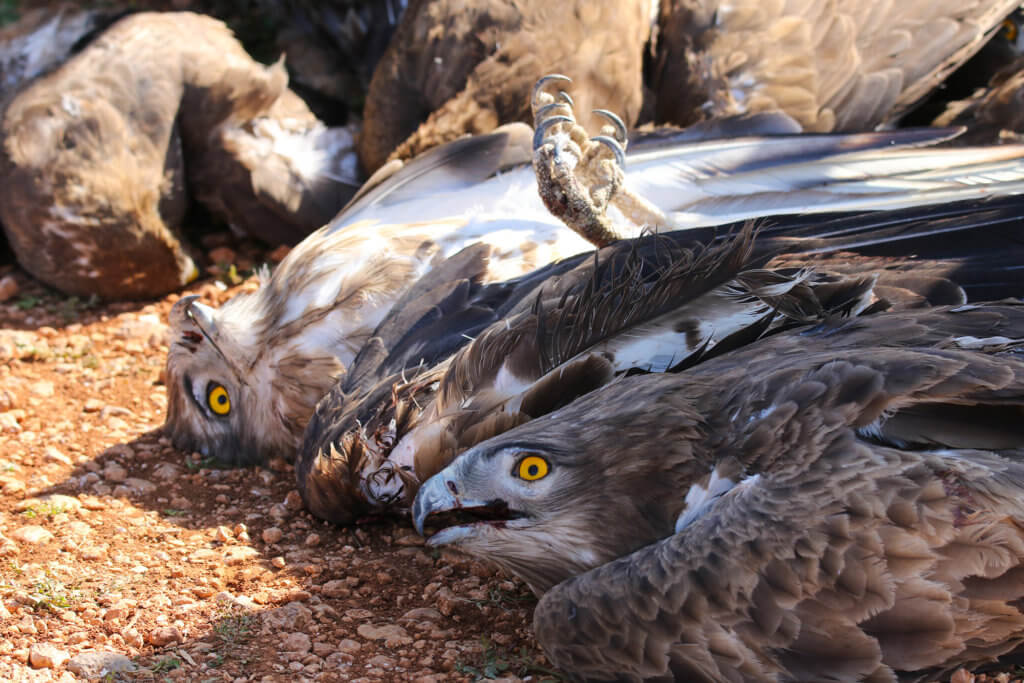
James (@JWTHogg) writes: I grew up on a farm on the edge of the North York Moors and have always been interested by nature and always wanted to be able to put a name to everything. Over the years this has grown to a love of birds and luckily circumstances have allowed me to travel around learning a bit more. In 2012 my wife got a job in Rwanda for UK-DFID and off we went (very safe, excellent birding). We had two children that got dragged round forests, swamps and savannah. Over four and a half years I learned a lot about the birds in that part of East Africa, becoming the eBird Reviewer for Rwanda. I volunteered for local conservation NGOs and acted as a consultant to government.
In August 2016 we all moved to Lebanon. The birding is maybe not as interesting, but the conservation challenges are in some ways much greater. I am now the eBird reviewer for Lebanon, help with the Lebanese Bird Conservation Coalition (LBCC) and more recently have started to do some voluntary work with the local Birdlife partner The Society for the Protection of Nature in Lebanon (SPNL).
Can Lebanon control illegal Hunting; a glimmer of Hope
Some of you may have read a guest blog I wrote in January 2017, Murder on the African Express where I provided a bit of insight into the problems of illegal bird killing in Lebanon.
In short the situation is bleak. The 2015 report by Birdlife International (The Killing) found that 2.6 million birds are illegally killed annually in Lebanon. But it is not just Lebanon where this problem exists, across Arabia and North Africa there is a similar situation, but it is reassuring to note that this problem is now being investigated (here and here). The shooting and trapping of birds of every species has been allowed to go unchecked for around two decades. The problem seems to have grown with the increased availability of guns, cheap calling machines and cheap nets, the present situation being particularly damaging to both bird populations and the reputation of the country. These activities have proliferated in a country where all hunting was banned by law.
I know many readers of this blog have strong views on hunting of any kind, but I would dearly love the situation here to be like the UK. In the UK, there does at least seem to be a modicum of control and a will from most people to obey the law. However, in Lebanon it seems that we are a million miles away.
Anyway, since my last blog there are strong indications that things are starting to change.
In April 2017, the Lebanese President Michel Aoun gave a good speech calling for more respect for the environment and birds; stating, “There should be a peace treaty between Man and the tree as well as Man and birds, because we continue to transgress upon them”.
Also in April 2017, the Ministry of the Environment announced a revised hunting law drafted in 2004 would finally be implemented. This is the first revision to Lebanese Hunting legislation since the 1950s. Hunting has technically been banned for 20 years. However, conservation groups and the government have begrudgingly had to acknowledge that prohibition has not worked, and definitely not when enforcement is entirely absent.
The new law will permit a hunting season from the 15th September till 30th January. It requires hunters to pass tests around gun safety and bird knowledge to acquire a license. It requires hunters to be insured and states the type of equipment that can be used. Importantly the law prohibits the use of calling machines, decoys, nets and glue sticks. It also sets a narrow list of target species and a strict bag limit for each of these. There have been complaints, but many legal hunters have welcomed the law as they see that poachers and trappers are bringing them into disrepute. Although the law allows for hunting, it does make it easier to prosecute people for not having licenses and anyone shooting outside the season is instantly behaving illegally.
I have mixed feelings about opening a hunting season and I do find it hard sometimes dealing with hunters, but the situation here is so bad that conservationists need to be pragmatic. The hunters are a large proportion of society and we have to find our allies where we can. Encouragingly, some very prominent and famous Lebanese hunters have come out publicly in support of the law and have openly opposed the netting of songbirds and the shooing of storks and raptors.
To coincide with World Migratory Bird Day (May 2017) SPNL organised a Workshop to start and develop a roadmap for implementing the law and for sustainable hunting in Lebanon. The workshop had a good outcome and was patronised by the President’s special advisor on the environment Mrs Claudine Aoun Roukoz. Interestingly several representatives from CABS were present and received an invitation from Mrs Claudine Aoun Roukoz to return later in the year.
So, September 2017 saw the first visit to the Middle East by a team from the German based Committee Against Bird Slaughter (CABS). They are known for their work in Cyprus, Malta, Italy, Spain and France, but have also ran a Facebook page about the problems in Lebanon since 2014 (see Stop Hunting Crimes in Lebanon). The mission comprised a multinational team from Germany, Turkey, Italy, France and the UK. It was facilitated by SPNL with the generosity of several local partners.

I have been following the work of CABS for a while and was pleased to find out that CABS would be visiting and was interested to find out how they work. I arranged to meet the group for a few hours during their trip. In some ways, the trip was different from most CABS missions, they were overwhelmed with hospitality, rather than the frosty reception they usually receive. Overflowing plates of Lebanese food and a warm welcome wherever they went. However, the indiscriminate shooting was probably some of the worst they have witnessed.
CABS goal was to get a better understanding of the scale of the problem and to identify some key poaching hot spots. Using this information to quickly raise awareness via social media, such as their twitter account and Facebook page. On top of that they also met with government representatives, SPNL partners, activist groups such as LBCC and responsible hunters who are trying to help and put an end to this problem.
In the field, CABS are an efficient unit and it was interesting to watch them operate, documenting everything and always going through the legal and proper channels, even if that doesn’t yield the result they want. The work they do is harrowing, finding piles of dozens of Honey Buzzard and Marsh Harrier carcases and watching poachers shoot protected species is deeply upsetting. It definitely takes a special resolve to do what they do and I am eternally grateful that people are willing to give up their time to do this unpleasant task on their holidays.
Whenever they found someone poaching they tried to interview them and most poachers were quite frank, if a little evasive. Many poachers were unaware that what they have been doing is wrong, clearly showing that raising environmental awareness is desperately needed.
CABS also raised some awareness of the trade in frozen songbirds. Packets of birds are available in most supermarkets and butchers and birds feature as a dish on many restaurant menus. Pleasingly, CABS posts led to a small victory when a major local supermarket chain removed birds from their shelves. It demonstrated that pressure can work and that social media can be used as a powerful tool to raise awareness quickly. However, this trade is huge and the vast majority of Lebanese restaurants and butchers sell birds.
September has also seen 400 law enforcement officers and forest guards being trained in the new law and bird identification. I have also been told that in the Lebanese equivalent of the GCSE’s that there were exam questions about the hunting law. There are positive things happening. But for me, the groups fighting this for many years and the birds it is all too slow, we need to see more action on the ground and some prosecutions.
What next? CABS are expected to publish a report of their findings from the trip. SPNL will continue to work with government and other groups to encourage enforcement of the law. The LBCC will continue to advocate for change and will work on a few actions that may speed up the process. Work will continue with responsible hunting groups to try and encourage them to join the fight and to educate the poachers.
We have a long road ahead and only through cooperation and working with others can we achieve our goal of ending the illegal killing of birds in Lebanon. The conservationists can work as hard as possible but the authorities need to step up enforcement and start prosecuting some of these criminals (that might sound familiar to UK readers?).
A few people commented on the last post saying that they would like to help. Please start by giving these organisations a follow via Facebook. Give them a bit of encouragement and if you have any particular skills that may be useful please let them know.

A very depressing situation, James, but you also describe some hopeful signs that progress is being made. You and the other people and organisations who have been working to highlight and address this problem deserve huge congratulations for what you have achieved so far and, more importantly, encouragement to continue what you are doing as there is clearly a very long way to go, still.
In terms of what readers can do to help, a ‘like’ on facebook is of course easily given; most of us will have limited possibilities to offer practical skills to your campaign but I wondered if there are ways in which we can contribute to the funding of any of the organisations involved? I would suggest that it may also be helpful for readers to write politely to the Lebanese government (or its embassy here in the UK) to express our concern about what is happening and point out the damage done to the country’s reputation. I note that Lebanon is not a Party to the Bonn Convention on Migratory Species but has signed the Memorandum of Understanding relating to birds of prey and has thereby committed to “… adopting and implementing measures to conserve migratory birds of prey and their habitats, for example, by: providing a legal framework to protect migratory species and a network of habitats and sites along their flyways; identifying important habitats, congregation sites and favoured routes; supporting relevant research and monitoring of populations, sharing results internationally; and, developing cooperative international projects and initiatives to promote effective conservation efforts.”
Johnathan,
Thanks for your comment. The situation is terrible. But something is starting to happen. We really need the Lebanese Authorities to start enforcing the law.
Likes via FB don’t help much. But LBCC for example would appreciate more members, some of which will have more experience in advocacy. CABS are always looking for donations, I expect they will come back to Lebanon and will be looking for volunteers.
Lebanon is not as yet a full member of CMS, but had signed the Raptor MOU. But I’m not sure that actually carries much weight.
You can try write to the Lebanese Embassy, the FCO and also your MEP.
Thanks again,
James
Having worked for the World Bank in Egypt I have had birds shot in front of me while trying to ID them and witnessed the netting of birds along the North coast. I have seen the Maltese hunters come to areas like Aswan and had locals run to me to see if I had any ducks to give them thinking my scope was a gun on a tripod! At Abu Simbel they left wounded Purple Herons to die with wings dropping having been shot. One business man in Cairo told me he would not shoot Pied Kingfisher again as they tasted horrible!
Another way forward for Lebanon would be to join the countries ridding themselves of Rat Poison using especially Barn Owls and Kestrels. [Note Britain is a long way behind in conservation of its birds!] Neighbours like Israel, Jordan and Palestine are now establishing ‘free zones’ with Israel now reducing the poison by 80%. So much so that if a farmer asks for poison the response is to get a Barn Owl!
Once the farmers want to protect their predators access to the fields by gun men would be challenged by the farmers protecting their birds and the message would travel fast around the country. Already other countries like Syria, Turkey, Cyprus and South Africa have started schemes [Not Britain!] and it is hoped to spread schemes along the North African coast.
John,
Thanks for your comment. The situation here sounds very similar to Egypt and sadly it seems to be quite common in the region. Most of these migratory bottle-necks have similar problems. There is a lot to do to get people appreciating nature as something more than a resource to be exploited.
The raptors / Owls and rat poison things is interesting and something I will try to start and raise this. Currently they shoot all the owls!
Thanks,
James
A typo has been pointed out to me. The season will end 31st Jan rather than the 18th.
Thanks,
James